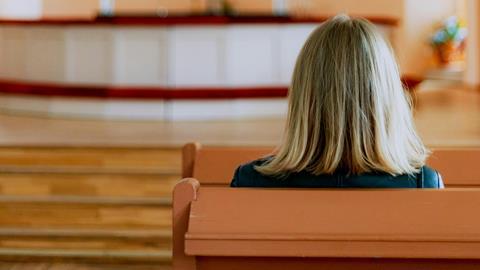Veronica Zundel explains why she has questions about the reported rise in young people attending churches
“This revival of an old play in the West End is a corker.” “There is a dubious revival of 80s fashion.” I write these sentences to illustrate why I have never been entirely happy about the use of the word ‘revival’ in a Christian context. The thing is, it seems to imply a restoration of the past, a return to ‘the good old days’ when the churches were full (they rarely were, in reality) and everyone, unless you were ‘chapel’, put ‘CofE’ on their census form. I, along with many others, prefer the term ‘renewal’ or even ‘move of the Holy Spirit’.
It is for this, among other reasons, that I am not putting too much weight on the so-called ‘quiet revival’ outlined in a recent report by the Bible Society. Yes, it is encouraging that there is a fourfold rise in the percentage of 18-24-year-olds, ‘Gen Z’, regularly attending church. To the question of whether these new young worshippers are the future of the Church, one can only answer a resounding “Yes”, since the older generation (like myself) are going to die off, so, without a new generation of Christians, the Church essentially has no future.
I have questions
Yet there are still some questions I want to ask of this phenomenon. First and foremost, what kind of Christianity are Gen Z gently flocking to? It seems that most of the new churchgoers are young men (hooray! Some men for the forlorn single Christian women at last) – but are they what used to be called ‘young fogeys’, searching for more ‘traditional values’ in response to a rapidly changing society? The figures tell us that the greatest growth in bums on pews (or these days, stacking chairs) is in Catholic and Pentecostal churches, which are generally among the most socially conservative denominations. On the other hand, it’s hard to believe that 18-24-year-olds are likely to condemn gay relationships or accept the exclusion of women from leading and preaching.
Another thing: it seems this ‘quiet revival’ began with young people attending cathedral services. This is quite understandable; they were no doubt drawn in by beautiful liturgy, professional music and awe-inspiring surroundings. But the thing about cathedral worship is that you can sneak in, sit at the back and leave afterwards without getting more involved than you want to. The whole show is run by experts, and unless you get on the flower rota you can pretty much stay an observer. This generation are known to be less keen on joining things: are they going to commit to the demands of church membership and to contribute their own gifts and insights to church life? In my little local Methodist church we have had a slew of new, younger people joining us over the last year or two (as well as one or two middle aged and elderly people) but they come and go – we might only see them once a month or so.
Is this increase in worshippers sustainable?
I suppose what I am really asking is: is this increase in worshippers sustainable, and is it making not just converts but disciples? Church growth is not about ministers in the toilets comparing the size of their congregations – it is about growth in Christlikeness, in depth of commitment and service, in unity of the body of Christ. How do we foster that among those who are currently perhaps just dipping their toes in the font or baptismal pool?
The encouragements and challenges
What is perhaps most encouraging about the Bible Society’s research is that new churchgoers are reporting better mental health and general wellbeing than their unbelieving neighbours, even than those who identify as Christian but no longer attend church. And, in many cases, that wellbeing is leading to a greater sense of connection with their local community, and to acts of service such as volunteering at soup kitchens. This is not faith that doesn’t extend beyond the walls of the Church. Interestingly, there has also been a growth in individual Bible reading, something which is of course music to the ears of the Bible Society.
I think those of us who have been around a few decades longer are facing a challenge here. We need systems, not only to integrate younger seekers into our churches, but to bring them into the fullness of being mature disciples. We need to help them interpret the Bible and apply it to today’s world, which means we need to be able to do that ourselves (The Bible Reading Fellowship’s Holy Habits series, to which I have contributed, is a useful resource here). And, above all, we need to listen to our new fellow Christians: to hear their concerns, to let them change us and our churches. Only then will they become the future of the Church.


































No comments yet